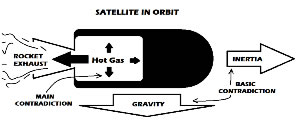Imternational Communist Workers Party
ICWPRedFlag.org
APPLYING DIALECTICS TO THE NEW MASS MOVEMENTS
Recent issues of Red Flag have featured reports
on mass protest movements in many places
like South Africa, Brazil, Greece and Egypt, and
the demonstrations about Trayvon Martin, just to
name a few. The rise of these movements is an
exciting new development that provides new opportunities
for winning masses to communist
ideas, but does this new activism change the
course of history?
To answer this question we can use concepts
from communist dialectics. Dialectics says that it
is the conflicts (or contradictions) in things that
make them change, and that some contradictions
are more important than others in determining
how things change. The conflict that has the
biggest effect on a process at some particular time
is called its "main contradiction" at that time. For
example, when a rocket engine is
started, the main contradiction is between
the expanding gases from the
burning fuel and the metal container
that surrounds the hot gas. The expanding
gas relieves this contradiction
by escaping out the tail of the
rocket and driving it forward.
The main contradiction is not the
only contradiction in a process, however, and
other contradictions have effects, some small and
some large. For example, earth satellites often
have small rocket engines to move them from one
orbit to another. When the rocket isn't turned on,
the main contradiction that determines how the
satellite moves is the conflict between gravity
that pulls it down and inertia that tends to keep
in going in a straight line. When the rocket engine
is turned on, the main contradiction shifts to the
expanding gas that is prevented from escaping
anywhere but out the back of the engine. The
contradiction between gravity and inertia is basic
in any moving object, that is, always present and
always having some effect. This contradiction is
only the main contradiction when the rocket engine
is not in use.
The main contradiction that has been driving
world history for many decades has been the rivalry
between the big capitalist powers, each trying
to dominate as much of the labor, markets and
resources of the world as it can. This network of
contradictions has led to two world wars in the
last century and many smaller ones recently.
Capitalism always has contradictions between
workers and capitalists. Exploitation of workers
by capitalists is the heart of capitalism, and always
provokes some degree of resistance by
workers. This worker-capitalist contradiction is
basic, that is, part of what makes capitalism capitalism.
Imperialist rivalry is also a basic contradiction
of capitalism that has developed to the
imperialist stage, a stage that exists now and has
for a long time.
Although the basic worker-boss contradiction
always exists and always produces some effects,
like strikes and protests, it isn't always the contradiction
with the biggest effects, that is, the
main contradiction. In fact, this basic contradiction
isn't the main contradiction throughout most
of the history of capitalism, but will become the
main contradiction when the revolutionary movement
is strong enough that overthrow of capitalism
will happen soon.
Contradictions among imperialist bosses and
between workers and bosses are not independent
of one another. The wars that resulted from contradictions
between bosses in the 20th century
weakened the Russian and Chinese rulers enough
so that workers' revolutions were able to win
there. The recent mass movements in many
places have created more intense contradictions
between workers and bosses there. They have
forced bosses to make some concessions to try to
prevent the movement from becoming a challenge
to the whole system. In Brazil bosses took
back bus fare hikes and president Roussef announced
half price movie tickets for people from
15 to 29, but fares are still very high compared to
Brazilian wages.
The fact that these reform gains are very modest
does not mean that the movements are not important.
The bosses' economic crisis has caused
mass misery and angry masses are responding,
demonstrating their potential for collective power
and organization, a lesson that millions are learning.
Intensifying worker-boss contradictions lead
more people to look beyond reform and oppose
capitalism. This is a very important opportunity
to build the communist movement. In Brazil, for
example, some people distributed Red Flag and
an ICWP leaflet during the demonstrations.
Until mass movements challenge the capitalist
system directly and fight for communism, the
contradiction with the biggest effects will remain
the rivalry of capitalist powers with each other,
not with the working class. That basic contradiction
will only become the main one when the
masses are won over to communist ideas and
fight under the leadership of a communist party.
In some places industrial workers have played
key roles in the mass movements, including aerospace
workers in Brazil, textile workers in Egypt
and miners in South Africa. These developments
confirm the ICWP's outlook that the industrial
working class is the key to mass mobilization for
communism. They also challenge us to use our
resources, and especially our paper Red Flag, to
reach masses of workers and give them the ideas
that they need to fight for communism and win.
Now is the time to make a big increase in the circulation
of Red Flag, and help make the basic
worker-boss contradiction the main one.